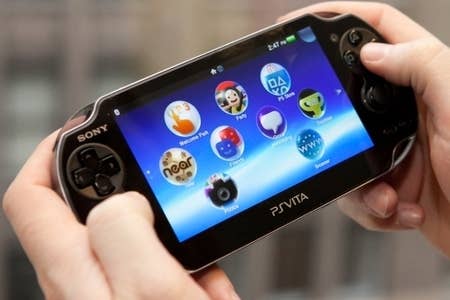Roundtable: Saving PlayStation Vita
Will Sony's portable meet an untimely death? Our staff looks at revitalizing the Vita
Vita may be Latin for "life," but Sony's latest handheld seems like it was born with one foot in the grave. Earlier this year, the system launched into a market where people were writing off handheld gaming as dead, analysts called for price cuts at launch, and developers were abandoning the fledgling system in favor of the 3DS (which didn't exactly get off to a great start itself).
Despite a strong showing at Gamescom, the news surrounding the PlayStation Vita hasn't improved much. Sony's admitted to difficulty getting third-party support for the system, and has been made to tap dance around the issue of sales, saying Vita is "maybe trending behind in certain territories."
"Where's the incentive for developers to support an Android platform only available on a handful of devices? The system's sales currently don't justify the effort"
So in the interest of revitalizing the Vita, the GamesIndustry International staff went around the horn, each picking one challenge the system is facing and suggesting how Sony can best meet that challenge. There's no telling if these suggestions would be enough to save the system in a world gone mad for tablets and smartphones, but it would be tough to make things much worse. So let's get straight to it and start with the single biggest problem facing the Vita today.
Dan Pearson: Software, Software, Software!
I was a big fan of the PSP and I've tried my hardest to love the Vita as much, but it's proving a difficult prospect.
I've used mine a fair bit, flicking between games like Everybody's Golf, Gravity Rush, Unit 13 and Frobisher Says, and I think that the Vita is a great bit of hardware. For what it is, it's priced pretty reasonably and, short of more storage, has nothing lacking in its feature design. It is, as people often said of the PSP, a great piece of kit.
Sadly, that statement was all too often followed up by a very pregnant "but..." and it's no different today. Vita is a compact, powerful device with oodles of potential, both as a games platform and a media device, but it has zero "must have" games in its catalogue.

Looking at Metacritic's listings we see a fair slice of friendly, reviewer pleasing green - a solid catalogue of good titles. But how many of them would you buy a system to play? My guess is not many, given that they're almost all either revamps of old games or available elsewhere. There's nothing on that list which gives most people the urge to splurge.
For me, there's one glaring, incredible omission.
Monster Hunter.
I could leave it there, almost. The Monster Hunter series, selling several million units in Japan alone, was an absolutely integral factor in the PSP being an also ran in the race with the DS rather than a DNF. The series never quite took off in the West, perhaps in part because of a PSP small install base, but for a long time it was the best way to play this unique and engaging series.
Then Capcom brought Monster Hunter Tri to the Wii and started a whole new friendship, one which has seen the series move its next two iterations to the 3DS, with no sign of a Vita game on the horizon. It might be a niche title in the West, but any game which sell 1.5 million units in Japan on release week, as Monster Hunter Freedom Unite did, is going to shift some hardware.
"It might be a niche title in the West, but any game which sell 1.5 million units in Japan on release week is going to shift some hardware"
I'm a bit of a MH fanboy, so I'm probably prone to over-stating the case here, but Sony desperately needs something to pull it out of the vicious circle that is seeing developers cancel Vita projects before they're even announced, however much Sony may protest that it's not the case.
The Vita passed the million unit sale mark in Japan this week, a week when its unit sales were among the lowest ever. That means it's currently selling more slowly than the Dreamcast. Let's hope it doesn't suffer the same fate.
Mike Williams: PS Mobile - Too Little, Too Late
Remember PlayStation Mobile? The platform is Sony's way of getting in on the hot mobile game action on PlayStation devices. Developers can create a title and release it on PlayStation Vita and PlayStation-certified Android smartphones and tablets. PlayStation Mobile was announced way back in January 2011, with the platform finally launching this month.
Sixteen titles round out Sony's launch list of titles, but that makes the list of PlayStation-certified devices look amazing. That list includes Sony's Xperia lineup, and HTC's One S, One V, and One X. Further certified devices are coming from other hardware vendors like Asus and WikiPad, but manufacturers aren't beating down Sony's door to get on board. That leaves Sony with a service that's not even available on most Android phones, including Samsung's best-selling handsets, let alone on Apple's iOS.
The PlayStation Mobile SDK is coming for developers in November, but the $99 license fee matches other platforms where developers can find far greater traction. This includes Google Play, which comes on most Android devices sold today. Where's the incentive for developers to support an Android platform only available on a handful of devices? The ability to play on the Vita? The system's sales currently don't justify the effort.
"The hardcore can whine about how inferior mobile is, but the hardcore have become a niche market"
Sony needs to get more PlayStation-certified devices out there. Missing larger Android vendors like Samsung, LG, and Motorola isn't going to fly. Selling more Vitas would also help on this end, but Sony still hasn't found the magic key to get consumers on its side. My colleagues have some ideas on how to fix that, but without more Vitas or PlayStation-certfied devices in consumers' hands, PlayStation Mobile is a non-starter.
James Brightman: The Price Is Not Right
Without a doubt, one of the top reasons for Vita's struggles is the hardware's retail price. If you had told me six years ago that I'd be able to get nearly Xbox 360 quality graphics in a sleek portable device with a big, bright and beautiful screen, I'd have been salivating, willing to pay quite a bit for this magical handheld from the future. Vita fits the description nicely, offering a robust console gaming experience with unparalleled visuals for a dedicated gaming handheld. The problem is that the market it launched into is a vastly different one from six years ago, and while Sony can attempt to justify the MSRP all it wants, $250 is too much.
While there are some nice bundles, including Assassin's Creed, Madden, or Call of Duty, the base model still needs to come down by at least $50. Nintendo realized the error of its ways with the 3DS and quickly lowered the hardware's price. $179 feels like a good value for a 3DS to most consumers, and the business is now strong as a result. $250, on the other hand, is immediately compared to not only the 3DS, but also popular smartphones and tablets. The prevalence of iOS and Android devices is taking its toll on Vita. When most people already have one of these devices, or can offer a hand-me-down to a teenager, why on earth would they go out and spend another $250 on a device that "only" plays games? The fact that software is another $40 or $50 each doesn't help any either.

Yes, the experiences on Vita are generally going to be richer and deeper in gameplay, but that's starting to change as more and more big name developers migrate to mobile. The games are getting better, they remain much, much cheaper, and for most consumers, they're "good enough" to satisfy that gaming itch. The hardcore can whine about how inferior mobile is, but the hardcore have become a niche market. The hardcore alone are not enough to sustain a business around Vita. Sony needs to make some drastic changes, and one of them includes slashing price, eating those losses, and hoping to entice consumers to pick up a Vita. There's no better time than this holiday to do it. Bring it down to $199, or better yet $179 to match 3DS, and start showing your third-party publishing partners that your installed base really is growing, so they can do more to support the platform.
As Dan already said, the Vita is a brilliant piece of hardware. It's place in the industry can still be saved if Sony would only get a little more aggressive on pricing.
Matt Martin: Sales Transparency Sorely Lacking
Hardware and software unit sales used to be key to convincing the industry your product was a success. A million boxed sales of your game? Let's put a crate of Champagne on ice.
There was fluff in those numbers of course: 'sold' are not 'shipped' are not 'sold in', but the point is that perception is reality. Publishers and hardware manufacturers used those numbers as lances to smash into rivals and knock them on their arses in a console war. But then along came digital sales and the concept of successful numbers went crazy. What's a success on digital platforms - 1 million, 10 million, 100 million? Into this world came the PlayStation Vita, loved by journalists and shrugged at by consumers. Hardware manufacturers created the boasting culture of sales and stats, but when they sheepishly keep their heads down it's clear the numbers are beyond disappointing. If you can't tell us your sales - or even massage your own numbers - your business looks like a flop.
"Sony's mindset is a generation behind even though the hardware is up to date. It's time to put the fate of PS Vita in the hands of the content creators"
There's no buzz around Vita. Look at the many conferences that litter the calendar and spot the "how I made my fortune on Vita" sessions. There aren't any. We know where the excitement is from the development and publishing community - iOS, tablets, Android, self-publishing, F2P and those silly VR goggles. I reckon I could have a more positive discussion about the N-Gage with a developer than one about the Vita. Sony can be as accommodating as it likes to developers when it comes to its hardware, but there are no numbers out there to convince customers or content creators that it's worth supporting.
What it needs to do is be completely honest. Chatter in the UK suggests that you only need to sell just over 100 units of a boxed Vita game to get into the top ten Vita charts. That's pathetic. We all know boxed games isn't what the Vita is about. Sony needs to stop sucking up to retail with boxed releases and share the real digital figures, because Vita is a digital console. Even if boxed games account for one tenth of Vita sales, bricks and mortar should be grateful. Theses are businesses that are selling plastic cards with virtual currency on them - the glamour went from High Street retail years ago, now it exists on scraps. You can bet Vita will suffer the indignity of getting pushed off the shelves if retailers need space for the Wii U this Christmas.
The beauty of the digital age is that there are stats galore. Publishers have been spinning numbers to suit their needs for years, so why can't Sony do it now? The most celebrated mobile developers are those that openly share their stats with their peers, whether good or bad. Game development is a community, equal parts learning, socialising, gossiping and love. Sony's Vita mindset is a generation behind even though the hardware is up to date. It needs to stop thinking like a closed platform and let developers share their numbers publicly, to inspire them to poke around the ecosystem, to look for niches, to exploit trends and figure out how to make a success - and money - on a potentially exciting system. The Vita is a digital console controlled by a publisher that doesn't understand its own market. Sony, put the fate of PS Vita in the hands of the content creators, it's your only hope.
Brendan Sinclair: Jack of All Trades, Master of None?
Personally, I love my PS Vita. It's actually my platform of choice when games are out in multiple formats. The system justified its price point for me several times over with just the time I spent playing The Pinball Arcade, Touch My Katamari, Ultimate Marvel vs. Capcom 3, and Sound Shapes. But even I have to acknowledge the thing has problems, the biggest of which is focus.
In perfect Sony fashion, the Vita does a little of everything, but it's not really great at much of it. The system is loaded down with features that technically add functionality, but nobody actually uses. Maps? Two cameras? Remote Play? A web browser? 3G? I'm still not even sure exactly what "near" does (something vague and social?), or why I can't delete app clutter like "Welcome Park" from the home screen. However, the one thing the Vita does exceptionally well is play traditional games on the go. It seems even the system's loudest detractors will acknowledge how impressive the hardware is. With a gorgeous screen, twin analog sticks, and enough horsepower to run some pretty impressive 3D, the Vita is much better suited to play the sort of games that dominated the market in the last 10 years than the ones that will dominate it for the next 10.
As such, the machine should be positioned in the market as a throwback, the product for the gamer's gamer. Don't shoehorn downloadable content into every game. Don't use online passes. Don't push free-to-play games. Open up the online store for indie developers (and their deluge of 2D platformers). The battle for the casual crowd has already been lost to tablets and smartphones. If Sony wants to salvage what's left, it would be better off almost trying to alienate that audience in an attempt to cultivate credibility with the core crowd. Mobile may be making the traditional gamer a niche market, but that niche still has lots of disposable income, and isn't exactly feeling well catered to these days.

